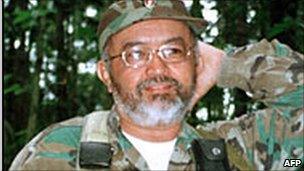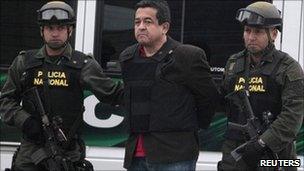Colombian Farc rebels' links to Venezuela detailed
- Published

Farc commander Raul Reyes, killed in a 2008 raid, left behind a mass of material
New analysis has set out the complex ties between Colombia's Farc rebels and the government of Hugo Chavez in Venezuela.
The report by the International Institute for Strategic Studies is based on thousands of rebel documents seized by Colombian forces in 2008.
Mr Chavez let the Farc use Venezuelan territory but also moved against them when it suited him, the IISS says.
The report was a "Latin America dodgy dossier", Venezuela's UK embassy said.
The IISS analysed the links , externalbetween the Farc, Colombia's biggest guerrilla group, and the neighbouring countries of Venezuela and Ecuador.
Its dossier is based on a two-year study of e-mails and documents recovered during a raid by Colombian forces on a Farc camp just over the border in Ecuador in March 2008.
This included computers, hard drives and memory sticks which held sensitive correspondence and documents belonging to a top rebel leader, Luis Edgar Devia Silva, better known by as Raul Reyes, who was killed during the raid.
The Colombian government gave the archive to the IISS to conduct a detailed analysis.
Complicated relations
The IISS says the documents show how the Farc rebels aimed to develop their international ties and how collaboration grew between the guerrillas and Mr Chavez's administration.
The Farc's ability to rely on cross-border sanctuaries has long been key to its survival, the report says, while President Chavez came to see the Farc as a strategic ally against the perceived threat of a US invasion or other plots.

Venezuela has deported suspected Farc members to Colombia in recent months
However, Mr Chavez's ties with the Farc are complex.
"Whenever he has judged it expedient, he has been ready to put the relationship on the back burner and even act against Farc interests," the dossier says.
The IISS suggests that it is probable that Venezuelan support for the Farc continues.
However, the report's main author, James Lockhart Smith, says the recent deportation of Joaquin Perez, an alleged top Farc guerrilla from Venezuela to Colombia, is highly significant, coming amid improving ties between the two nations.
Interpol involvement
The Farc's attempt to win similar support in Ecuador has been less successful, the IISS concludes.
Indeed, Ecuador was often an uncertain or downright hostile environment for the rebel groups because of the extensive penetration of Colombian or US intelligence.
The Venezuelan embassy in London, external challenged the assertion that the files had not been tampered with by the Colombian authorities before being handed over to Interpol for authentication.
And the embassy said the Colombian Supreme Court had dismissed the "evidence" from the computers as inadmissible in prosecution cases against Colombian politicians.
The embassy said the report could be "part of an aggressive propaganda tool against Venezuela" at a time when relations between Venezuela and Colombia had "reached a level of stable cooperation and friendly dialogue".
In its findings, Interpol concluded , external that Colombia did not conform to internationally recognised principles for handling electronic evidence but also that "no user files have been created, modified or deleted on any of the eight Farc computer exhibits following their seizure on 1 March 2008".
- Published26 April 2011
- Published12 April 2011